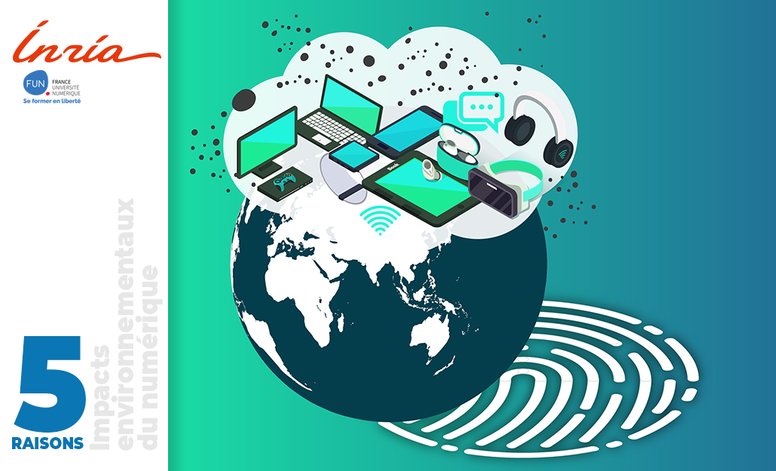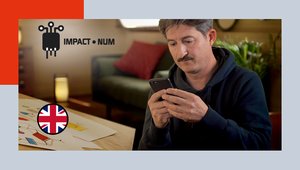5 reasons to register to the "Environmental Impacts of Digital Technology" course
Categories
About the course05/06/2025

Reason n°1 : Raise awareness of environmental matters of digital technologies is fundamental...
Digital technologies now represent for around 4% of greenhouse gas emissions only for their direct effects alone, and their energy consumption is growing exponentially. How can we find our way through the mass of figures and information that can lead us to both alarmist theories and excessive confidence? How can we measure this impact in a proper way? And finally, what solutions are within our power to act concretely and to reflect collectively on the place we want to give to technologies in our society?
Based on current research data, the course provides a better understanding of positive and negative effects of digital technologies on the environment.
Reason n°2: To have access to course content written by experts in the field
Co-produced by Inria and the Class'Code Association, and supported by the Délégation Numérique pour l'Education, this course is a collective work with the contribution of more than thirty experts in digital technologies and their impact on the environment: scientists, expert consultants in the field, scientific mediators, and computer science educators. Many of the authors participate in EcoInfo (CNRS), a working group dedicated to the analysis, awareness and training of the environmental impacts of information technologies.
Reason n°3: To progress easily in your learning thanks to a diversity of formats
To keep interest and to progress effortlessly in your learning process, different formats are used in this Mooc:
- Educational videos to quickly understand the fundamental issues of this training in a dynamic note,
- Serious but slightly offbeat activities that allow participants to take stock of one's practices, preconceived ideas or unthinking,
- Pedagogical activities that allow you to question the indicators and the data, analyze the trends and make your own diagnosis, but also to discover what we can do as consumers, designers, teachers, citizens.
Reason n°4: Explore this course at your own rhythm and according to your level of knowledge of the subject
The designers of this course wanted to facilitate access for all. The course of about 5 hours allows to discover the subject through videos and activities, for everyone: teachers, scientific mediators, the general public as well as students, from the second year of secondary school.
This course is open in "self-paced" mode, i.e. over the long term. Everyone can follow it at their own pace and come back it as often as they wish.
Reason n°5: Accessibility and bilingualism (FR and EN)
For accessibility reasons, all the content of this training course (videos, educational activities, theoretical course sheets, bibliographies, glossaries) is also available in text format (.pdf).
Furthermore, Impact'Num has two versions in two languages: in French and in English.
Moreover, all the French and English training resources are available via a portal so that teachers can easily use them in class (also accessible to the general public as a basis for discussion among family and friends). They are freely reusable under a Creative-Common CC-BY license.
Related posts
5 raisons de s’inscrire au MOOC « Éducation inclusive : ressources numériques adaptées pour la classe »
Categories
About the course5 raisons de s’inscrire au MOOC «Les précarités alimentaires»
Categories
About the course




